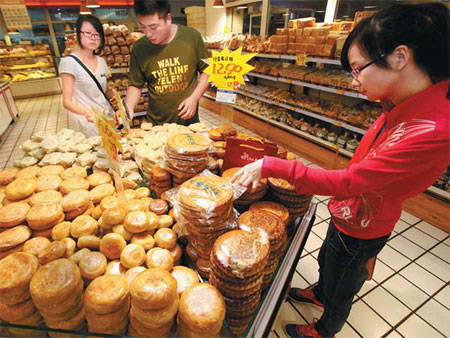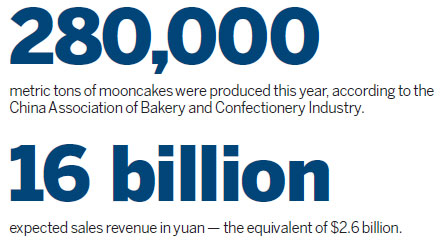An eclipse of the mooncake
|
Customers choose low-priced mooncakes at a supermarket in Weifang, Shandong province. Zhang Chi / for China Daily |
Shi said this is "my most important season" and the amount of business he lost was incalculable.
According to the Shanghai Confectionary Industry Association, at least 40 percent of mooncakes sold every year were group-purchased by companies and institutions as gifts for their "clients on the special occasion".
How much of that 40 percent will vanish this year is not yet known, but the association said mooncake sales in Shanghai were down at least 20 percent this year in five-star hotels, restaurants and bakeries.
"It's just a few weeks before the festival. Usually this is the peak sales time," said Feng Fusheng, deputy secretary-general of the association. "If there's no peak now, it's not going to happen at all, because mooncakes are a seasonal thing."
Nationwide, mooncake sales have also declined by 20 percent compared with last year, the China Association of Bakery and Confectionery Industry said. It estimated that 280,000 metric tons of mooncakes were produced this year, and sales revenue is likely to exceed 16 billion yuan ($2.6 billion).
Pastries, crab, Moutai
It is not the first time the central government tried to regulate the mooncake market. In 2006, at a time when the pastry's packaging was getting ever-more sumptuous, the government stipulated that the cost of the packaging could not account for more than 25 percent of the factory expense of the item.
Manufacturers sought new ways to enhance the luxury value and began stuffing mooncakes with expensive fillings like truffle and abalone.
While traditional mooncakes are filled with red-bean paste and lotus seeds and cost 5 to 6 yuan, the tendency to turn them into luxury items has persisted.
It was even joked about. During last Mid-Autumn Festival, Chinese film director Feng Xiaogang wrote on his micro blog that if anyone wanted to give him an expensive gift, he would prefer cash to mooncakes.
But this year is different. Not only has the overall volume of mooncake sales declined, so has the price, in spite of the general inflation. Feng from the Shanghai association said that 78.6 percent of the mooncakes sold in Shanghai cost less than 200 yuan for packages with six to eight pastries.
And only 14 out of the 406 kinds of packed mooncakes cost more than 400 yuan, the so-called luxury mooncakes.
The main victims of the mooncake crackdown are the five-star hotels and high-end restaurants, and their suppliers of luxury mooncakes.
























